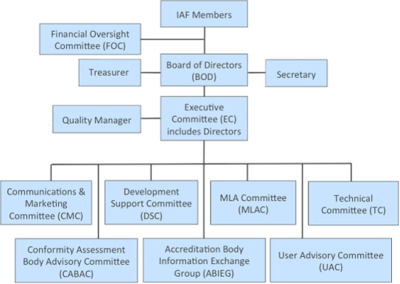International Accreditation Forum (IAF)
The International Accreditation Forum, Inc. (IAF) is the world association of Conformity Assessment Accreditation bodies and other bodies interested in conformity assessment in the fields of management systems, products, services, personnel, and other similar programs of conformity assessment. Its primary function is to develop a single worldwide program of conformity assessment that reduces the risk for business and its customers by assuring them that accredited certificates may be relied upon. Accreditation assures users of the competence and impartiality of the body accredited. IAF members accredit certification or registration bodies that issue certificates attesting that an organization's management, products, or personnel comply with a specified standard (called conformity assessment).[1]
The primary purpose of IAF is two-fold. Firstly, to ensure that its accreditation body members only accredit bodies that are competent to do the work they undertake and are not subject to conflicts of interest. The second purpose of the IAF is to establish mutual recognition arrangements, known as Multilateral Recognition Arrangements (MLA), between its accreditation body members which reduces risk to business and its customers by ensuring that an accredited certificate may be relied upon anywhere in the world. The MLA contributes to the freedom of world trade by eliminating technical barriers to trade. IAF works to find the most effective way of achieving a single system that will allow companies with an accredited conformity assessment certificate in one part of the world, to have that certificate recognized elsewhere in the world. The objective of the MLA is that it will cover all accreditation bodies in all countries in the world, thus eliminating the need for suppliers of products or services to be certified in each country where they sell their products or services. Certified once - accepted everywhere. The members of IAF are mainly classified into accreditation body members, association members, regional accreditation groups, and observer members.[2]
Organizational Structure of International Accreditation Forum (IAF)[3]
The terms of reference, tasks, and duties of the Members, the Board of Directors, and the Secretary are defined by the Bylaws and the Memorandum of Understanding (MoU). The highest level of authority in IAF is the Members in a General Meeting. General Meetings make decisions and lay down policy in the name of the members. The Board is responsible for legal actions to be carried out on behalf of the members, for developing broad policy directions for IAF, and for ensuring that the day-to-day work of IAF is carried out in accordance with policies approved by members. The Executive Committee is responsible to the Board of Directors for the day-to-day work of IAF on the basis of decisions made by the Members and directions by the Board of Directors. The operations of all IAF Committees and Subordinate Groups, including the Executive Committee, are subject to the IAF General Procedures (ref IAF PR 2 - see Publications). The relationships between the various parts of the organization of IAF can be found in IAF PL 5 which can be downloaded from Publications, Policy Documents.
Benefits of the IAF MLA[4]
Accreditation bodies around the world, which have been evaluated by peers as competent, have signed an arrangement that enhances the acceptance of products and services across national borders. The purpose of the arrangement, the IAF Multilateral Recognition Arrangement (MLA), is to ensure mutual recognition of accredited certification between signatories to the MLA, and subsequently acceptance of accredited certification in many markets based on one accreditation.
- For Government - The IAF MLA provides governments with a credible and robust framework on which to further develop and enhance government-to-government bilateral and multilateral international trade agreements. The long-term aim is the fully accepted use and recognition, by both public and private industries, of accredited certification, including certificates from other countries. In this way, the free-trade goal of “certified once, accepted everywhere” will be realized. Public Sector Assurance, a website jointly developed by IAF/ILAC/ISO/IIOC, showcases the benefits of accredited testing, inspection, and certification to meet policy objectives. The site showcases case studies, independent research, and supporting information from around the world in key policy areas to demonstrate how different tools help government officials and regulators deliver results. View the site.
- For Regulators - The IAF MLA represents an internationally recognized ‘stamp of approval’ to demonstrate compliance against agreed standards and requirements. Consequently, the risk is minimized, as decisions will be based on reliable certificates. Many specifiers, such as government agencies, have recognized the importance of credible accreditation programs that are developed against internationally recognized standards. Accreditation and the IAF MLA help regulators meet their own legislated responsibilities by providing a globally recognized system to accept the accredited certification.
- For Business - the IAF MLA provides businesses that are procuring products and services with greater confidence in their consistency of quality. Businesses can therefore select suppliers from further afield in the knowledge that they will receive products and services that conform to a recognized standard.
- For Manufacturers - Having products assessed and certified as conforming to a particular standard allows manufacturers and service providers to distinguish themselves from less reputable suppliers, thereby creating a competitive advantage. The IAF MLA ensures that standards, specifications, and conformity assessment methods are the same, allowing one certificate or certification to be recognized around the world. This lowers the cost of accredited certification and reduces the risk of products or services being rejected by international trading partners.
- For Consumers - Consumer confidence can be gained from goods or services that bear a mark or carry a certificate of conformity. The IAF MLA ensures that such goods and services placed on the market, from whichever country of origin, meet standards of quality and safety.
See Also

